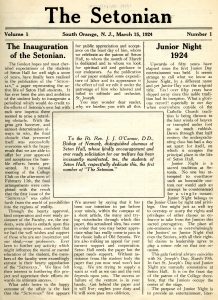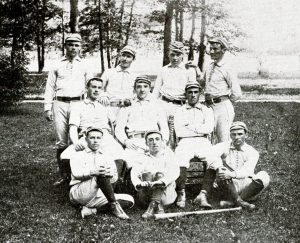This diary was written by John Erigena Robinson, who graduated from Seton Hall College in 1874. His diary concerns his everyday life at the college, including worrying about assignments, writing letters to his family and friends, and playing for the college’s baseball team. The campus that Robinson studied at during the mid-1870s was one that centered on a structured, liberal arts education that was emblematic of Catholic higher education during his age. He entered into a world of study at Setonia that consisted of two sessions lasting five months apiece from September through June.
John Erigena Robinson was the son of William Erigena Robinson, a congressman and a journalist whose political career is mentioned several times in the diary. Robinson must have been inspired by his father’s journalistic pursuits, because he writes in the diary about his desire to start a student newspaper for Seton Hall College. On January 26, 1873 he wrote:
“To start a paper. How, when, and where? These were the things that occupied me during the day and I may add during the night as I went to bed and fell asleep with visions of shears scraps and papers flying here and there. If we can only get the permission of Malley who owns a press and of Dr. Corrigan who heads the College we are all right. We have fixed the name it is the Setonian. We have got the outline and the matter for each page and now for the permission of the two worthies who at least in this case have a great case in hand!”
Unfortunately, Robinson never realized his dream of starting The Setonian. A full explanation is never given in the diary, but on February 14, 1873 he laments that his plans will not come to fruition:
“George and Bill received a valentine today. I also received one. It had a picture of an editor on it and some ridiculous rhyming lines beneath it. It was sent to me as it had got around that I was going to start a paper in the college. Alas, the poor ‘Setonian’ is but a dream of the past.”
The reasons why Robinson was not able to start a college newspaper are unknown, but fortunately for Seton Hall it was not completely “a dream of the past” but simply deferred. A college newspaper was eventually founded in 1924—51 years after Robinson’s plans and with the same name he proposed, The Setonian.
Beyond the classroom, Robinson played baseball for the Seton Hall nine also commonly known in that age as the Alerts which began as a popular sport on campus during the late 1860s and engaged in more formal play the following decade. According to existing documentation they played local teams mainly their arch-rivals St. John’s College (now known as Fordham) of the Bronx during the 1873 season. The main highlight of his time was a defeat of St. John’s 24-13 during October of that year which carried the squad into the following campaign where they would play the same opponent twice more. Robinson would be among the pioneer players for the team that would grow in competitiveness and success over subsequent seasons.
John Erigena Robinson’s academic experience at Seton Hall College was based on a structured, liberal arts education that was emblematic of Catholic higher education during his age. His course of study included courses in Latin, Greek, history, philosophy, and oratory. This course catalog for the 1872-1873 academic year shows the schedule Robinson would have followed in the second term of his junior year, which is when he begins keeping the diary.
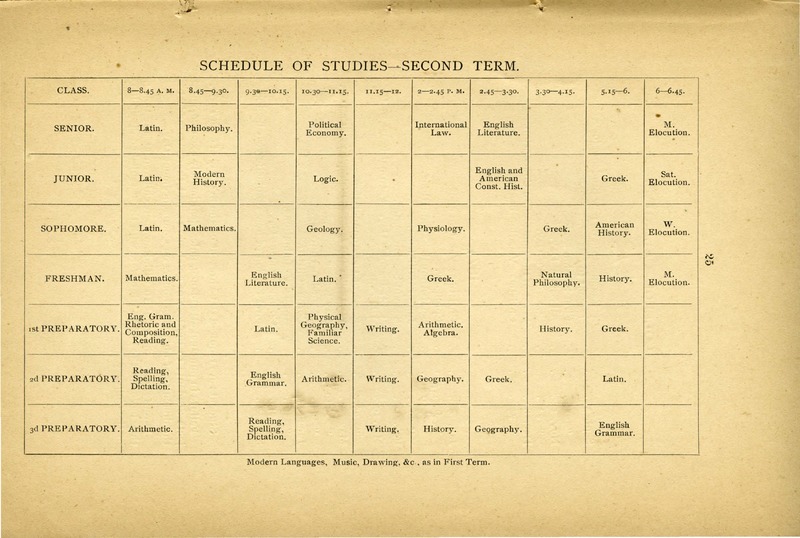
In January 1873, Robinson’s diary shows he was very concerned about producing a good speech for the “Junior Exhibition,” an event in which the juniors of Seton Hall College showed off their oratory skills alongside musical performances. Students’ families and members of the community attended the event. Robinson spends a great deal of time practicing his speech before the Exhibition. On January 17, 1873 he writes:
“I am preparing for the Junior Exhibition as hard as I can. I was up two or three hours this evening speaking as well as I could. I have improved wonderfully. At least this is what everyone tells me. Indeed I am surprising myself. During all the time I have been in Elocution Class I have never no not once spoken a piece anyways decently. I have made up my mind time and gain to cast off my backwardness in speaking and by a grand effort to keep on improving. Notwithstanding all my resolutions it was not until I commenced to speak my oration or whatever it is termed that I have made that effort that points out a better future in the line of speaking at least.”
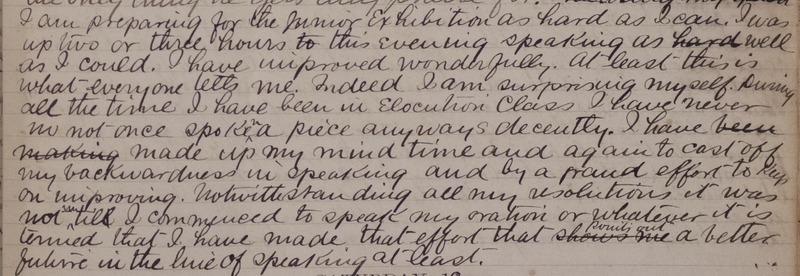
On the day of the exhibition (January 29, 1873) Robinson puts his nerves aside and delivers his speech with great success:
“Before I know where I am I am speaking. A line put in its wrong place makes me skip two or three pages. Unknown to anyone except those who have heard my speech three or four times. I go back. Not one word of prompting. I come to papa’s poetry as I end its first verse I am enthusiastically clapped. I come down amid great applause. I have done well. Papa and all are pleased. Hurrah!”
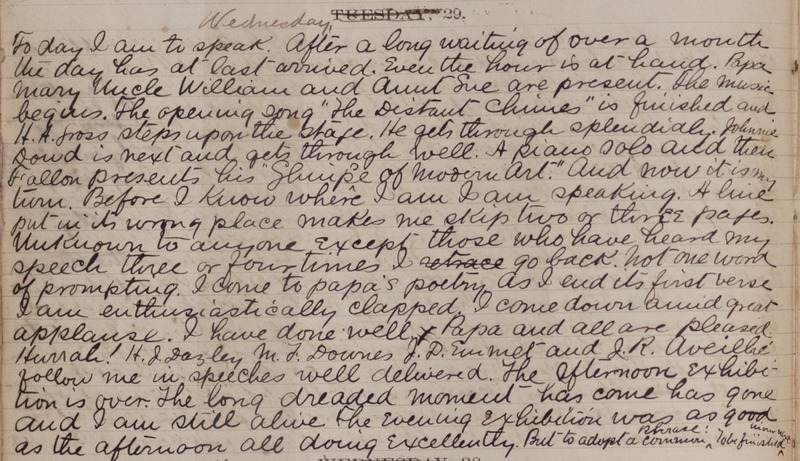
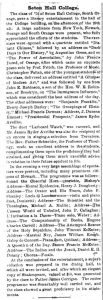
From the South Orange Public Library Local History Collection.
The Junior Exhibition was reported on in the Newark Advertiser and the South Orange Bulletin. This article appeared in the South Orange Bulletin on February 1, 1873, and calls Robinson’s speech “the best address of the day.”
